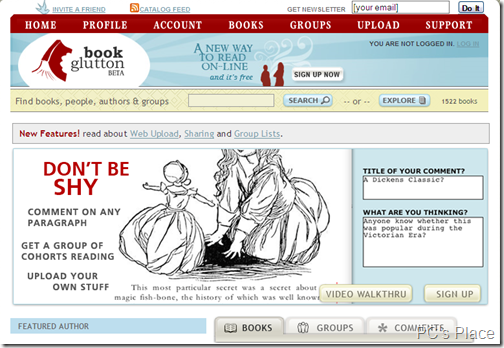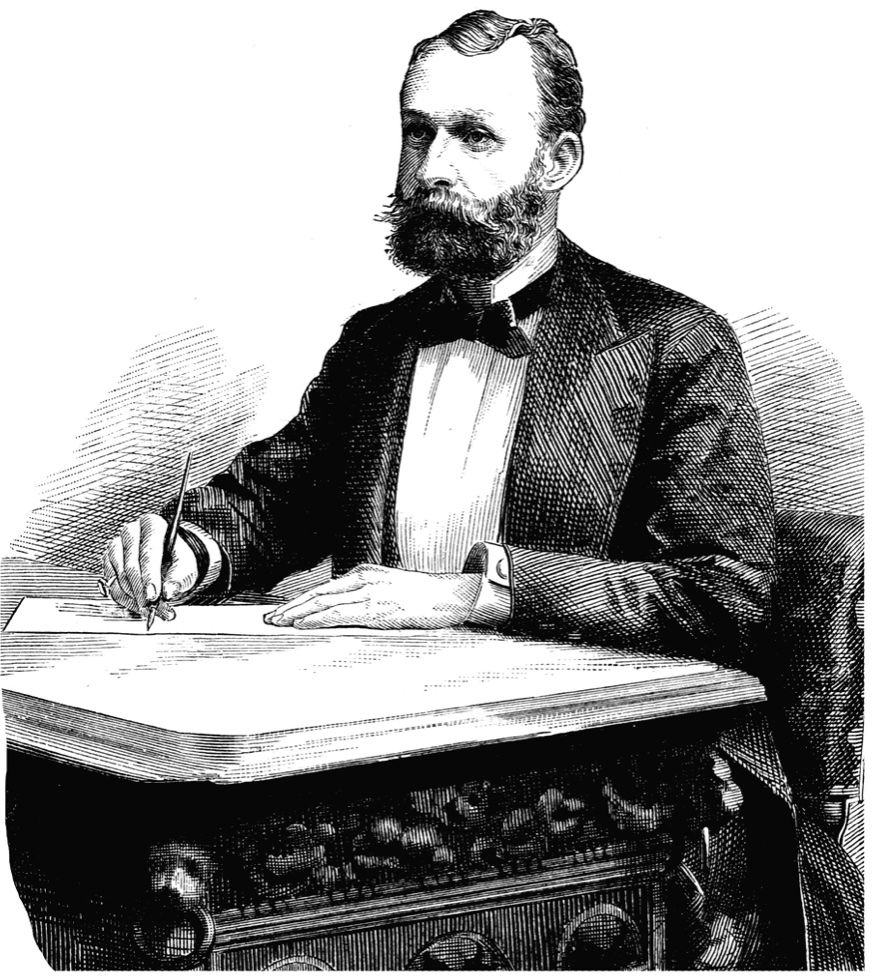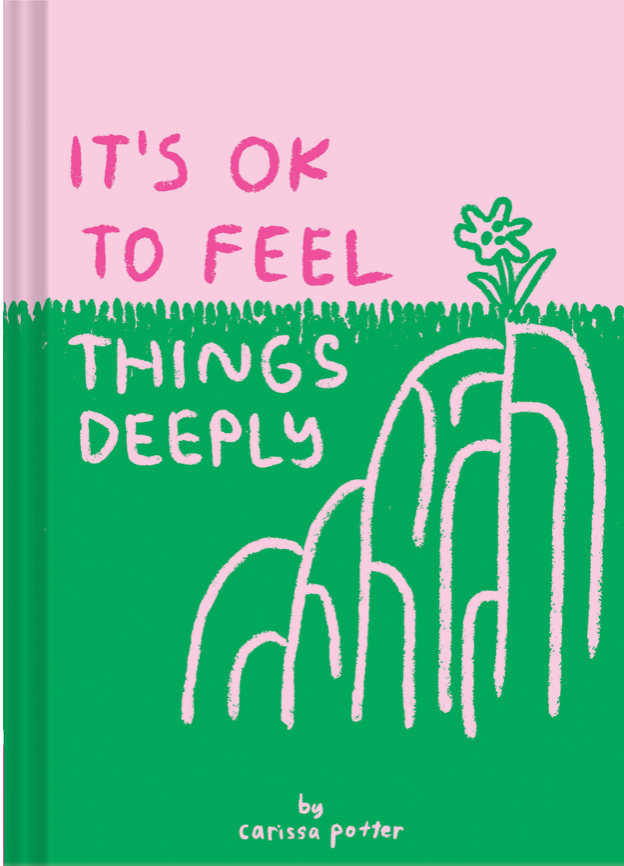
Browsing through a used bookstore a few weeks ago, I [Rebecca] came across mysterious handwritten notes in Annie Dillard’s Teaching a Stone to Talk. These notes were written not in the margins, but between lines of text. Not only that, they weren’t about the book-they looked more like a poem. Had someone grabbed this book in the dark, thinking it was a notebook? Or, was the poem doing a duet with Annie Dillard?
Marks that readers leave behind them are cryptic signs of a solitary activity. Recently, through various web sites, readerly note-taking has become more communal. BookGlutton is one new manifestation, and Jenni and I decided to explore it. Here, we discuss our experience of reading the Spoon River Anthology by Edgar Lee Masters on BookGlutton.com (our respective online personas are “librarydork” and “jennilovesbooks“).
Jenni Simmons: Where did you hear about BookGlutton? Do you consider yourself a book glutton? (I am.) What piqued your interest in the web site?
Rebecca Tirrell Talbot: All Things Considered featured BookGlutton and since you can chat about books and leave public notes, it seemed the site would change one of my favorite activities from solitary to social. What fun!
I am absolutely a book glutton. A day that begins with coffee and reading is pure luxury. On the other hand, isn’t it odd that readers give themselves such self-deprecating nicknames-worm and glutton? Maybe we believe that books are so good, they transform worms and gluttons into noble things.
Rebecca: How do you generally go about reading a book? What changed when you began to read on BookGlutton? Was it the same as what you had anticipated?
Jenni: I make a cup of coffee or tea. I prefer reading in the soft armchair in my living room, or in bed (often too late at night). I will never need Prozac as long as I have good books. I’m not into dog-earing pages; I use one or two bookmarks. Lately, I’ve been disciplining myself to take notes in a Moleskine with my favorite pen. I like to read in peace and quiet, but my notes are a chaotic mess, so I’m relieved to strap shut the sleek black notebook.
Using BookGlutton made reading less of an escape and more of a studious experience, which is not bad at all. Reading relaxes me, but I want to learn and grow as well. And I didn’t take the Spoon River Anthology to bed. I don’t have a Kindle (yet), and my MacBook is not the same light tactile experience as a well-worn paperback.
I wasn’t sure what to expect – I’ve never taken part in a book club, though I plan to start one soon. So at first I had public note-taking anxiety, but then I eased into it with confidence. I realized that although my note-taking is not a perfect art, my thoughts are valid, and brain fodder for my writing. And seeing your thoughts next to mine challenged and sharpened my perceptions of Masters’s poems.

Jenni: Do you normally take notes while reading? Do you write in a notebook, on the book’s pages, or elsewhere? Do you think note-taking helps you understand the book better? What about writers such as ourselves – should we always take notes? Is there a balance?
Rebecca: If I own the book, I take notes, bend the spine, fold corners, write cross-references and underline. Some might see this as desecration; I see it as my journey. I guess it’s like hiking-the more strenuous the journey, the more likely that future travelers will know I’ve been there. Notes are like my campfires and shelters, my machete paths through the brambles. Later on, I don’t always see the notes as helpful-my college books are full of observations like “awesome description” or (horror of horrors) random smiley-faces-but I do think that the process of taking notes helps me make a book my own.
Is it important for writers to take notes? That’s a great question. It’s essential for writers to understand and process what other writers are up to, but whether that involves carrying the work around in your head or desecrating pages is very personal.
Rebecca: What are your thoughts about making reading into a more social experience?
Jenni: Reading is somewhat like any art form: it begins with a person in solitude, taking in the words, their imagination creating the visuals. But I think it must become a social encounter – whether that means reading aloud to your spouse, joining or starting a book club, or more modern socializing through a venue such as BookGlutton. The web site flashes a phrase on the main page: “Books are conversations.” Just as the author converses with the reader through the book, we ought to further that conversation from reader to reader like wildfire.
Jenni: Have you ever led a book club, or read a book with another person? Does BookGlutton give enough of the true discussion experience – learning from each other’s insight, and so on?
Rebecca: My MFA program at Roosevelt University was a lively literary community and had a book club feel. Now that it’s over, a book club would enrich my life. BookGlutton might provide that. I learned a ton from your insight into Spoon River. If only BookGlutton could also provide wine and baked goods, it would be a perfect book club!
Rebecca: Who do you think this site is most suited for? Who would you recommend it to?
Jenni: Because using BookGlutton requires having a computer, it requires at least a little technical savvy to enjoy. It’s perfect for people like you and me who live in different states, but want to discuss books with each other. And it is great for friends who, even though they may live in the same city, have busy schedules. They could enjoy a book club of sorts on their lunch break, or while winding down at night in their home.
Jenni: Would you recommend BookGlutton to your students?
Rebecca: Yes! I plan to. It will give them a perfect learning community outside of class.
Jenni: Do you read a lot of books electronically? If so, which devices do you use? Did you enjoy reading the Spoon River Anthology on BookGlutton? Did you find it easy to navigate and take electronic notes?
Rebecca: Spoon River Anthology and The Autobiography of Saint Ignatius are the only books I’ve ever read online (the latter on Project Gutenberg). A clunky laptop is my only electronic reading device! Reading on BookGlutton wasn’t as relaxing as lazing about on the couch, but it made me feel like I was just doing some light reading even though Edgar Lee Masters’ poems are amazing and profound. It was so easy to keep clicking onto the next page! I’m guessing this feeling of “light reading” is something Travis Alber and Aaron Miller, BookGlutton’s creators, foster on purpose. Text is nicely sized with ample white space.
Rebecca: What suggestions do you have for BookGlutton when they move out of their beta version? What did you find most enjoyable about this version?
Jenni: I had to Google for background information to the Spoon River Anthology, so I recommend lengthy synopses and introductions to each book, to let users do all of their reading on the BookGlutton site. I hope they expand their selection soon – I hunted high and low for some of my favorite authors to no avail. It would be lovely to be able to edit my previously posted comments, too. Oh, and an iPhone app would make reading on BookGlutton easier and more portable.
Free books are very enjoyable to me. You hand me a good, free book, and I’m a happy gal. The flip side to a smaller selection of books on BookGlutton is that you and I discovered a literary masterpiece about which I didn’t know much. My favorite technical features are the ability to embed the book on a web site, and e-mail the book to another bibliophile. It’s kind of like a virtual library, except no late fees!
Jenni: I’ve never read this kind of “fictional poetry” genre such as Masters’ Spoon River Anthology. Have you read anything like it? Did you end up liking this book? Who were some of your favorite voices from the grave in Spoon River, Illinois?
Rebecca: I know there are others out there and I should read them, because I love it when writers challenge the boundaries of genre. So, I guess that’s a clue that I liked Spoon River!
Favorite voices? Trainor, the Druggist, who commented on combustible relationships; Nellie Clark and Pauline Barrett, whose stories are devastating; Mrs. Williams, the milliner, who advises women that a nice hat has saved many a marriage; Lucinda Matlock, Masters’s fictionalized version of his grandmother.
Rebecca: In many ways, I found Spoon River Anthology to be a dark work: gritty to the point of being bleak, honest to the point where it was sometimes quite wrenching. Did you find the same thing? If so, did you also see aspects of it that were beautiful or even redemptive?
Jenni: Yes. Though Masters’s writing is beautiful and evocative, it was depressing to read too many poems in a row. I had to ingest them slowly due to the dark, bitter narratives. I literally craved redemption, forgiveness, and kindness in a small town of murders, broken marriages, and false accusations. But within their collective voice, lights do shine in the darkness, such as Emily Sparks praying for her student, Reuben Pantier, and writing him a letter “of the beautiful love of Christ.” Reading the Proverb-like contrast of epitaphs – both the wise and foolish – also got me to thinking: How do I live my life? What do I hope to say from my own grave to my spouse, my family, my neighbors?
As Annie Dillard says, “How we spend our days is, of course, how we spend our lives.” The residents of the fictional Spoon River, Illinois are a literary reminder to live and love well, and be grateful for my life – for all I have been given.
To see Rebecca’s and Jenni’s notes on the Spoon River Anthology on BookGlutton, create an account and join the conversation.



